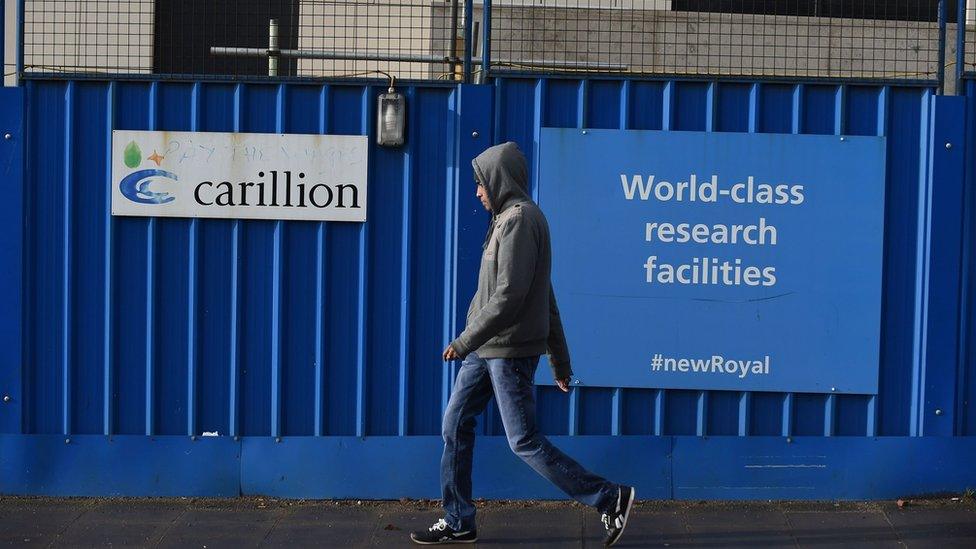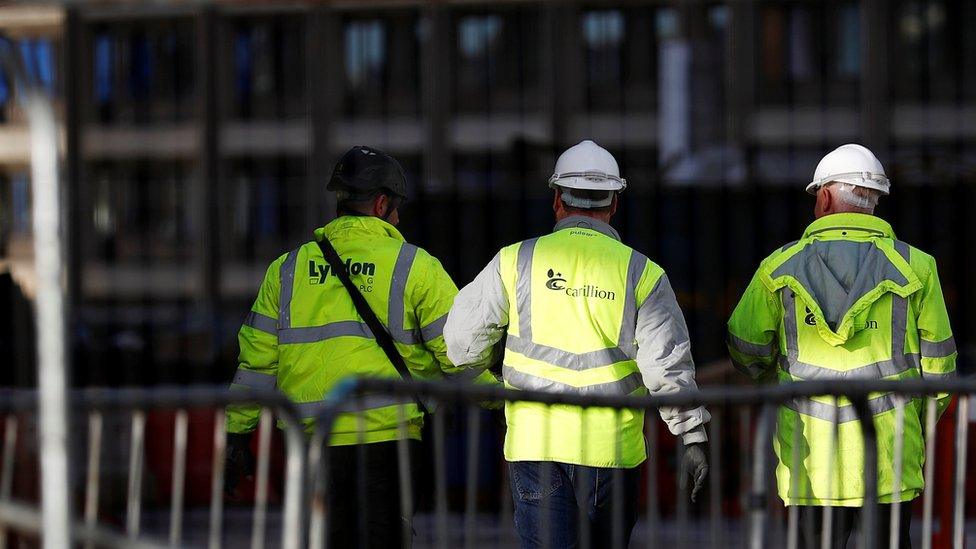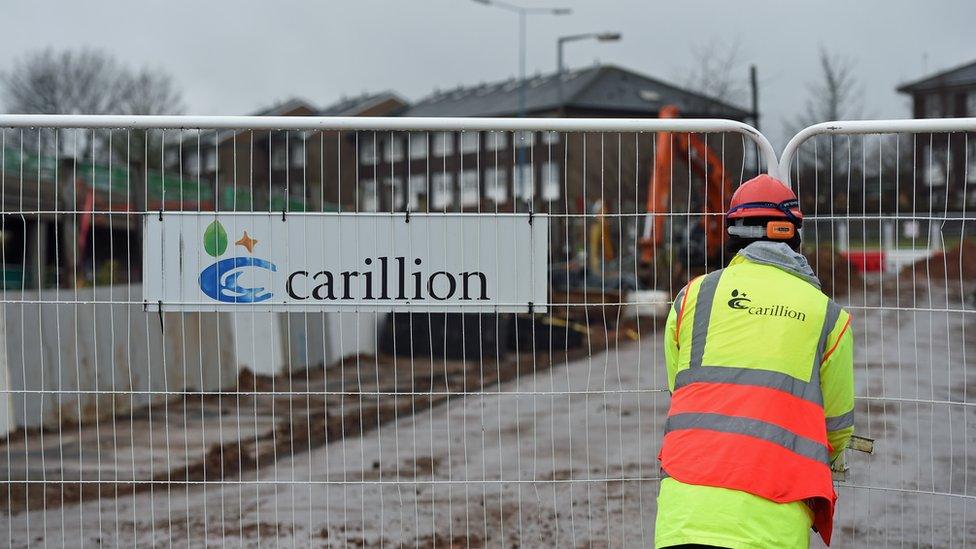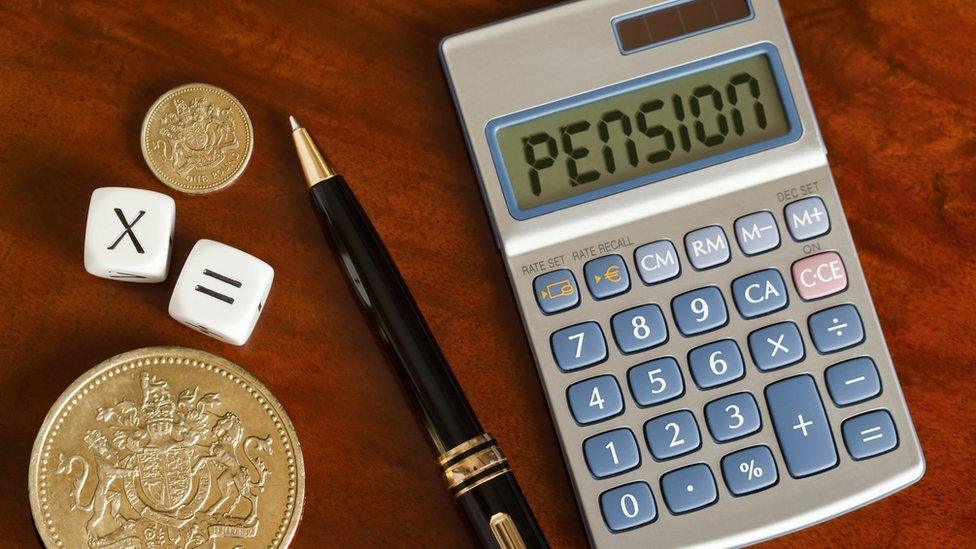Carillion: Are pensions on the brink?
- Published

The collapse of the construction firm Carillion is the latest high-profile failure of a company with a large pension deficit.
Such cases may have raised concerns among workers generally over whether their employers' pension promise will be broken.
They have also prompted debate over the future of workplace pensions.

What sort of pension do you have?
Workers with defined benefit (DB) pensions know exactly how much they will receive in retirement.
Such schemes are based on either a worker's final salary or their career average earnings.
Workers with defined contribution (DC) schemes save into a pension pot, which they can then use to buy a retirement income or cash-in subject to tax. The size of the pot depends on stock market performance.
The chairman of trustees of Carillion's pension scheme, Robin Ellison, has suggested in a letter to a committee of MPs that there was a funding shortfall of around £990m with Carillion's defined benefit pension schemes by the end.
This is higher than had generally been thought at the time of the company's collapse.
A spokesperson for the Pensions Regulator said it had been "working proactively" to protect pension member benefits for several years.
It said information available before July 2017 "did not highlight sufficient concern" over Carillion to justify the regulator stepping in.
However, for Carillion to have such a deficit begs the question of whether all defined benefit schemes are in the red.
The answer, provided by the Pension Protection Fund's regular review of the sector, external, is that there are plenty of schemes in surplus.
The latest figures show that there were 1,878 schemes in surplus, and 3,710 schemes in deficit at the end of last year.
Collectively, these schemes had a total deficit of £103.8bn.
This figure seems to be enormous, but it does fluctuate significantly, and it represents pensions that will be paid over decades.

Is a pension deficit a problem?
A major study by the Pensions and Lifetime Savings Association (PLSA), published in September, found most defined benefit schemes had a sustainable model for meeting future payouts.
In other words, if they are in deficit, they still have an adequate plan to pay people their pensions in the future, for example by the employer putting more money into the pot.
However, the PLSA said that three million savers in the remaining schemes had only a 50% chance of receiving the payouts they had been promised.
In total, there are 11 million people in the UK with a defined benefit pension.
The PLSA said there was a "real possibility" of a collapse for more high-profile pension schemes, and that one solution could be the pooling of resources into "super-funds", which would then have bigger investment opportunities.
Pensions consultant John Ralfe has described the super-fund plan as "outrageous".
He said there was "no crisis in defined benefit pensions, so there is no need for crisis measures".
His confidence is based on the existence of the pensions "lifeboat" - the Pension Protection Fund (PPF).

What happens to pensions when a company goes bust?
For the most part, the PPF steps in to pay defined benefit pensions but, for some, this may be less than they expected.
Under this system:
Anyone over pension age will receive their pension in full
Pension payments related to employment from 5 April 1997 will rise in line with inflation, subject to a ceiling of 2.5%. Payments relating to employment before this date will not rise
For workers under pension age, 90% of the pension will be paid, subject to a cap
That cap is currently set by the government at £38,505, which equates to £34,655 when the 90% level is applied, per year. There are different caps at different ages, external
Future pension increases may also be lower than expected, not necessarily matching inflation
Carillion had 14 defined benefit pension schemes, with 27,500 past and current workers receiving or set to receive payments from these schemes in retirement. All of those are in the process of transferring over to the PPF.
Lots of commentators have pointed out that, while this places extra pressure on the PPF, it is in a good position to cope. The PPF's latest annual report showed that it had balance-sheet assets of £34bn.

What about defined contribution pensions?
Start a new job now and it is highly unlikely that you will have access to a defined benefit pension scheme. Instead, workers will get a defined contribution pension, in a scheme usually run by the employer or by an insurance company.
If the company goes bust, then the situation with these schemes should be simpler.
The employer makes regular contributions to a worker's pension pot when that employee is paid.
If the company goes bust, those contributions stop, as they would if the worker left their job.
However, the pot is still in the employee's name and is still invested ready for their retirement. When the employee gets a new job, he or she will usually start a new pot.



- Published17 January 2018

- Published17 January 2018

- Published27 September 2017
